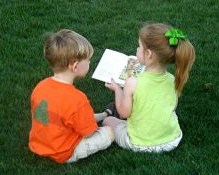By Jennifer Lockert
As a teacher of young children a common question I get is, “How do I get my child reading over the summer?” All children desire and need a break from the routine and demands of the school year, but teachers will tell you that children who participate in reading activities over the break have an easier transition in the fall. So how can families balance their summer activities and schedules with reading? Easy! Just make a game plan that suits your child’s interests and your family’s agenda.
For preschool-aged children it all begins with play. Continuing to provide independent and group play, structured and unstructured play times, taking excursions in your neighborhood, and participating in meaningful conversations with your youngster will heighten vocabulary and thinking skills, which enhance reading development. Isn’t is reassuring to know that simply sitting in the grass with your child and talking about clouds is helping her prepare to read?
Read with your child daily, maybe a specific time each day, using a variety of books. Grab a large basket, fill it with picture books, rhyming book, non-fiction books, predictable books, fairy tales, nursery rhymes, and how-to books, and park yourself under a tree to read. Even if your child wants to read the same story over and over or seems to want to look at the pictures in one book for hours on end, this is reading. Rejoice! Keep a book basket in the car and add some audio books or books with CDs. Match book choices to experiences. For example, if you are going to the beach, peruse books about the beach to help your child make connections. Visit the local library or book store and enjoy story time or just relax in the air conditioning and read. Refresh your choices every week or two and keep the favorites on hand.
Homemade and store bought games like alphabet bingo, puzzles with letters or words, searching for letters on license plates or words on road signs while on a drive, or playing Go Fish with alphabet cards are fun summer activities that keep the learning going.
For elementary-aged children, this is a wonderful time to get children to delve into personal interests and passions. Do you live with a nine-year-old who is crazy about dolphins? Indulge in books and websites that foster this interest and encourage him to join a group that protects dolphins and their habitats. Accessing the public library, new and used book stores, or trading books with friends is a great way to build a repertoire of reading experiences. Passionate readers can start a book club with friends or family, complete an author study, or challenge themselves to complete a set number of hours of reading over the summer.
For the reluctant reader, find materials that will motivate her to read, even if it may not appear as challenging as you may wish. Comic aficionados or pre-teen drama enthusiasts may be more likely to read books they choose over prescribed “classics,” and above all we want them to read, read, read! (Of course, parents should monitor material for age-appropriateness.) Parents should also continue to read with their older children when possible. Elementary-aged children still love the intimacy that comes with hearing their parents read to them. And this is a great chance to read a novel that you choose or may be a little too hard for them to get through independently.
Don’t hesitate to participate in school, library, or bookstore summer reading incentive programs that offer rewards for participation. Keeping track of reading activities at any age is tangible and motivating. You can even set this up at home; create a chart in which your child can keep track of time spent doing reading activities and decide how these accomplishments can be awarded. Perhaps your child will earn new books, an ice cream party, stickers, a movie night, or computer time.
Speaking of computers… parents are often wonder about how much time is appropriate for children to spend on games and websites. When allowing computers, consider how your child balances this activity with others and how they are using the computer. Help your child select websites and games that enhance reading development and then monitor their time. When used appropriately, the computer can be an asset to reading growth.
Finally, reading is spurred by experience and modeling. Taking your children to interesting locations – a park, a science museum, or the pool – can all inspire knowledge, questioning, and language development, the foundation of reading progression at all ages. Modeling your interest and commitment to literacy is deeply connected to your child’s participation. Let them see you peruse a magazine, check out books from the library, scan newspaper articles, and discuss good books with others. Your actions and enthusiasm set the tone for a season rich with reading.
*Jennifer Lockert is the Director of Reynolda Preschool in Winston-Salem
Do you have additional ideas you can share?
















